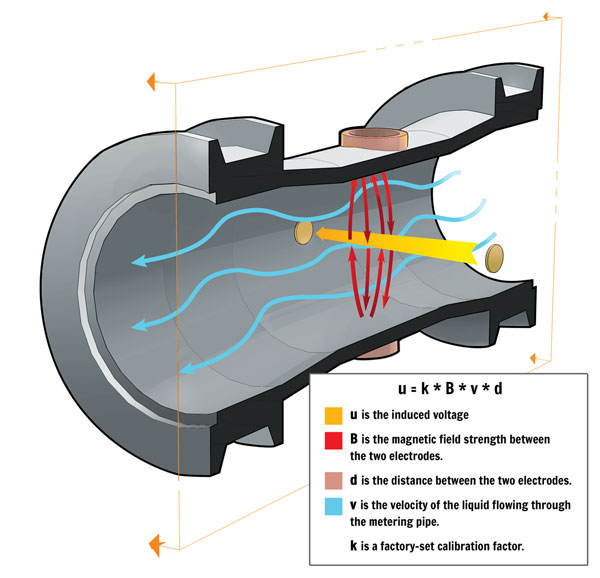 Magnetic flow meters are increasingly taking the place of traditional mechanical flow meter designs. While they both measure the flow of a liquid in a pipe, they do so in different ways.
Magnetic flow meters are increasingly taking the place of traditional mechanical flow meter designs. While they both measure the flow of a liquid in a pipe, they do so in different ways.
The most common mechanical flow meters are inserted into a pipe and use a turbine, wheel or paddle to measure velocity and then calculate volumetric flow by knowing the cross section area of the pipe in which they are installed. The most common type of the above listed mechanical flow meters utilizes a turbine that rotates as the flow of water applies a force to the blades. The rotation of the turbine is proportional to the velocity of the fluid moving past it. Once the velocity is known, the flow can be calculated.
Other mechanical meters use the same basic mechanical principles to measure flow. They operate most effectively when used in a full pipe and in an area with stable flow and little-to-no turbulence. Mechanical flow meters will operate in all types of liquids, but are prone to clogging and deteriorating performance due to solids accumulating on the turbine blades. They also obstruct a portion of the flow and require regular maintenance of the gears and moving parts.
Magnetic flow meters calculate the velocity of a moving substance using Faraday’s Law. The meter body consists of a coil system, which is external to the process, but encapsulated in the meter body wrapping around the outside of the internal pipe wall, and operate by creating a magnetic field across the section of pipe. As the fluidflows through the magnetic field, conductive particles in the fluid create changes in voltage across the magnetic field.
This variation can be measured and used to calculate the velocity of the material flowing through the pipe. Like mechanical flow meters, magnetic flow meters operate effectively only if the pipe is full and in areas where the flow pattern is stable. Magnetic flow meters are effective when used with any concentration of wastewater and with other water-based liquids. However, magnetic flow meters are not designed for use in distilled water, oil and other hydrocarbons, and most non-water based substances.
Magnetic flow meters are superior to mechanical flow meters because they don’t impede flow, don’t become clogged with solids and have no moving parts to maintain or replace.